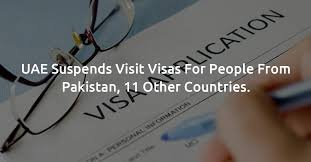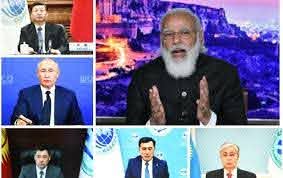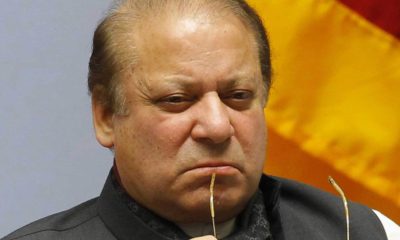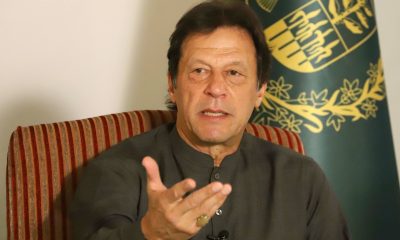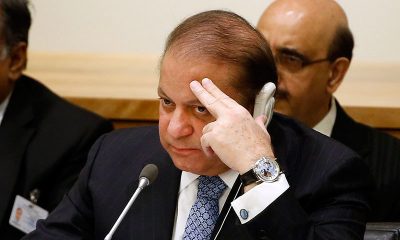World
First ever polio injection drive launched in Pakistan

Islamabad: Health authorities in Pakistan have started administering polio injections for the first time in the country.
Authorities have started administering polio injections in the Federally Administered Tribal Areas (Fata), which is for the first time in Pakistan’s history, Dawn online reported citing officials as saying.
The injectable/inactivated polio vaccine (IPV) is said to be highly effective in preventing paralytic disease caused by all three types of poliovirus and is currently being used by a majority of the polio-free developed and advanced countries.
Officials in the Fata secretariat said that polio injections have been planned for 17,393 children in the frontier region of Bannu district in Khyber-Pakhtunkhwa.
They said that so far about 5,906 children have been injected with anti polio vaccines and the five day drive will end Friday.
The experts are of the view that injections would be more effective as compared to polio drops, secondly the polio vaccination had been proved an uphill task due to law and order situation and attacks on the vaccinators besides denial on part of the parents.
The inactivated polio virus vaccine is injected into a muscle or under the skin and is usually given by a healthcare professional in a hospital, clinic, or provider’s office.
Pakistan is one of the three polio-endemic countries which have been using oral polio vaccine (OPV) since the disease has hit the country.
The Polio Eradication and Endgame Strategic Plan 2013-18 of Global Polio Eradication Initiative (GPEI) had hinted at the new scheme in its April 2013 report of introducing IPV for the first time in three polio endemic countries – Pakistan, Afghanistan and Nigeria.
The year 2014 was the darkest year for the Pakistan polio programme, with the number of confirmed cases reaching 296 — the highest number of cases reported in the country since 1998.
Polio cases in Pakistan reached a low of 28 in 2005 but rose to 198 in 2011, In 2012, Pakistan recorded 58 cases, while 93 were recorded in 2013, as reported by End Polio Pakistan.
World
Lockdowns in China Force Urban Communities to Defy Censorship and Vent Frustration Online

Shanghai’s rich middle class is leading a wave of online dissent over the strict and prolonged lockdowns imposed in various parts of the country. Chinese internet censorship is struggling as patience is wearing thin in many urban centers, coming up with creative forms of online protests.
Social Media Posts Revealing Lockdown Tension in Shanghai
Drawn-out lockdowns are nothing new in China as authorities insist with the nation’s zero-Covid policy since the start of the pandemic. Currently over This time around, however, metropolitan areas like Shanghai are increasingly difficult to keep quiet, given that its more than 25 million residents have seen weeks of total isolation along with food shortages and many other service interruptions.
Dozens of towns and reportedly over 300 million Chinese citizens have been affected by lockdowns of different severity. As expected, urban netizens have been most outspoken over their difficulties by finding creative ways to get around state censorship and bans placed on topics, news comments and spontaneous campaigns.
Shanghai residents have been using mobile proxies and hijacking seemingly unrelated hashtags to talk about healthcare issues, delivery failures and the overall severity of their situation. The “positive energy” that the Chinese government wants to transmit during the recent prolonged series of lockdowns does not come naturally to those counting food supplies and online censors are working hard to filter words, trending topics and undesired social media sharing.
WeChat groups and message threads are under constant monitoring. Posts questioning the zero-Covid approach have been quickly deleted, including by leading Chinese health experts like Dr. Zhong Nanshan. Video footage is soon censored and protests and investigations are quickly made to disappear.
Where this has not worked, officials have exposed banners with warnings and outright threats like “watch your own mouth or face punishment”, while drones have been patrolling the city skies. Yet, if anything, this has led to further tensions and unspoken confrontation with Shanghai’s educated and affluent middle class.
Creative Online Solutions Harnessing Civic Energy
Announcements by Chinese social media that they would be publishing the IP addresses of users who “spread rumors” have not helped either. Tech industry research has shown that much of Asia’s tech-savvy population has a habit of using mobile proxies and other privacy tools, quickly finding workarounds to browse the internet freely and talk to the world about the hottest topics.
The sheer volume of forbidden posts is already a challenge for the very censorship system, experts explain. Unable to track all trending hashtags, state workers overlook topics that speak about the US, Ukraine or other popular news. Linking human rights elsewhere to their situation, Chinese online dissidents establish their informal channels and “hijack” the conversation to share personal or publicly relevant information about the Covid suppression in their town.
Sarcastic and satirical posts still dominate. Others hope to evade the censors by replacing words from famous poems or the national anthem. One thing is certain – social media, when harnessed with the right creativity, has proven its ability to mount pressure on the government in even some of the most strictly controlled tech environments like China.


